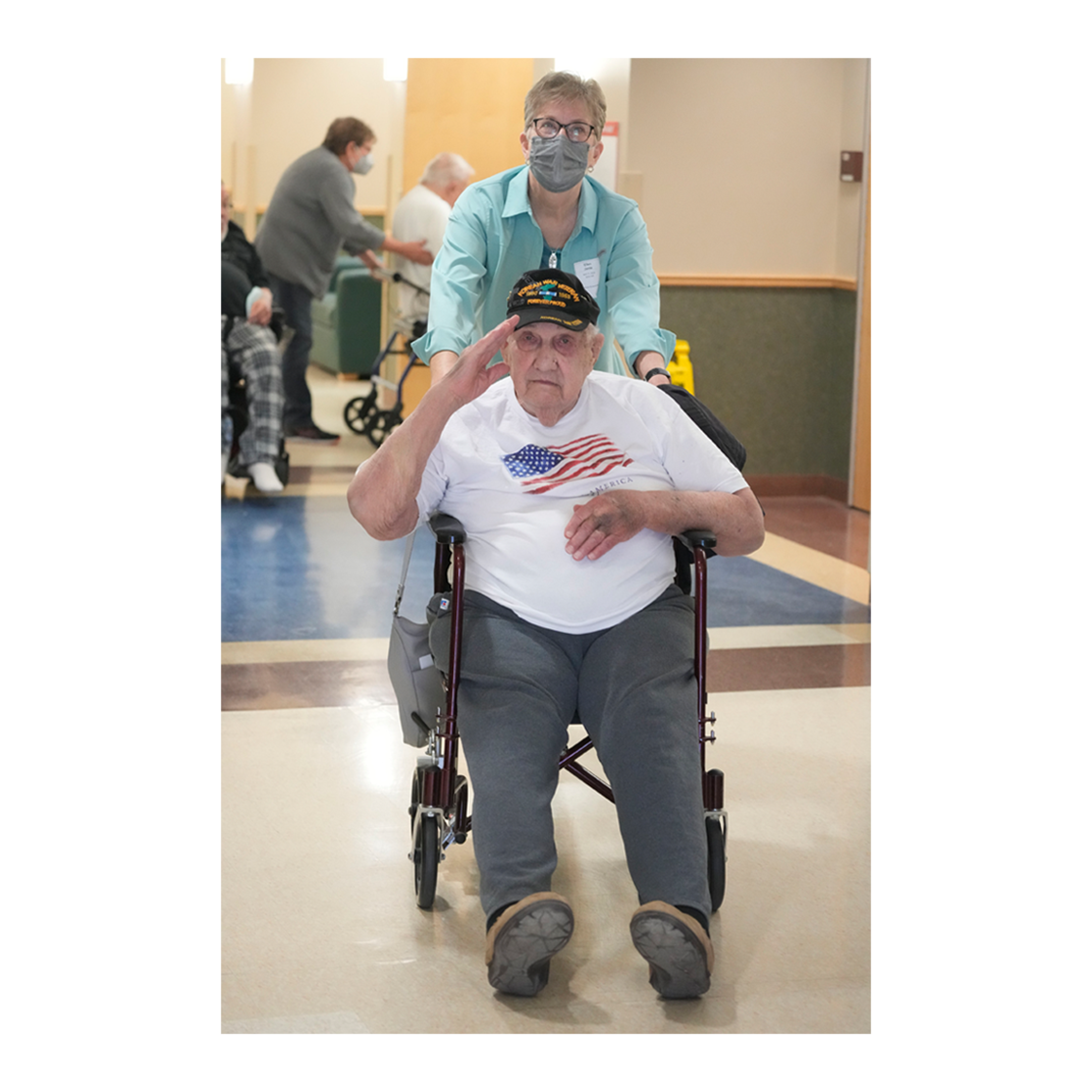
Veteran Gordon Voss, 91, salutes as volunteer Ellen Jante pushes him at the state veterans home in Union Grove in May 2022. Voss said there are numerous problems with care including not being able to get enough water, especially at night. "I am spitting cotton balls" by morning, he said. Mike De Sisti / The Milwaukee Journal Sentinel
Navy veteran Randy Krall was so dehydrated when he was rushed from a veterans nursing home in Union Grove to a hospital that doctors had trouble getting a urine sample to diagnose what was wrong with him.
Earlier that day in November 2020, Krall’s wife, Luane, got a call from a nursing aide at the Racine County veterans home where Randy lived. His chart showed he hadn't had water for much of the day, the aide said.
Alarmed, Luane asked that Randy be taken immediately to the Veterans Administration hospital in Milwaukee.
Randy survived, but a few weeks later he returned to the Union Grove veterans home, and his condition declined.
On Dec. 19, 2020, there were signs that Randy, 69, was dying. His skin color was changing, and his breathing increased, but no one contacted family, contrary to the facility's policy. A nurse called Luane after Randy had died.
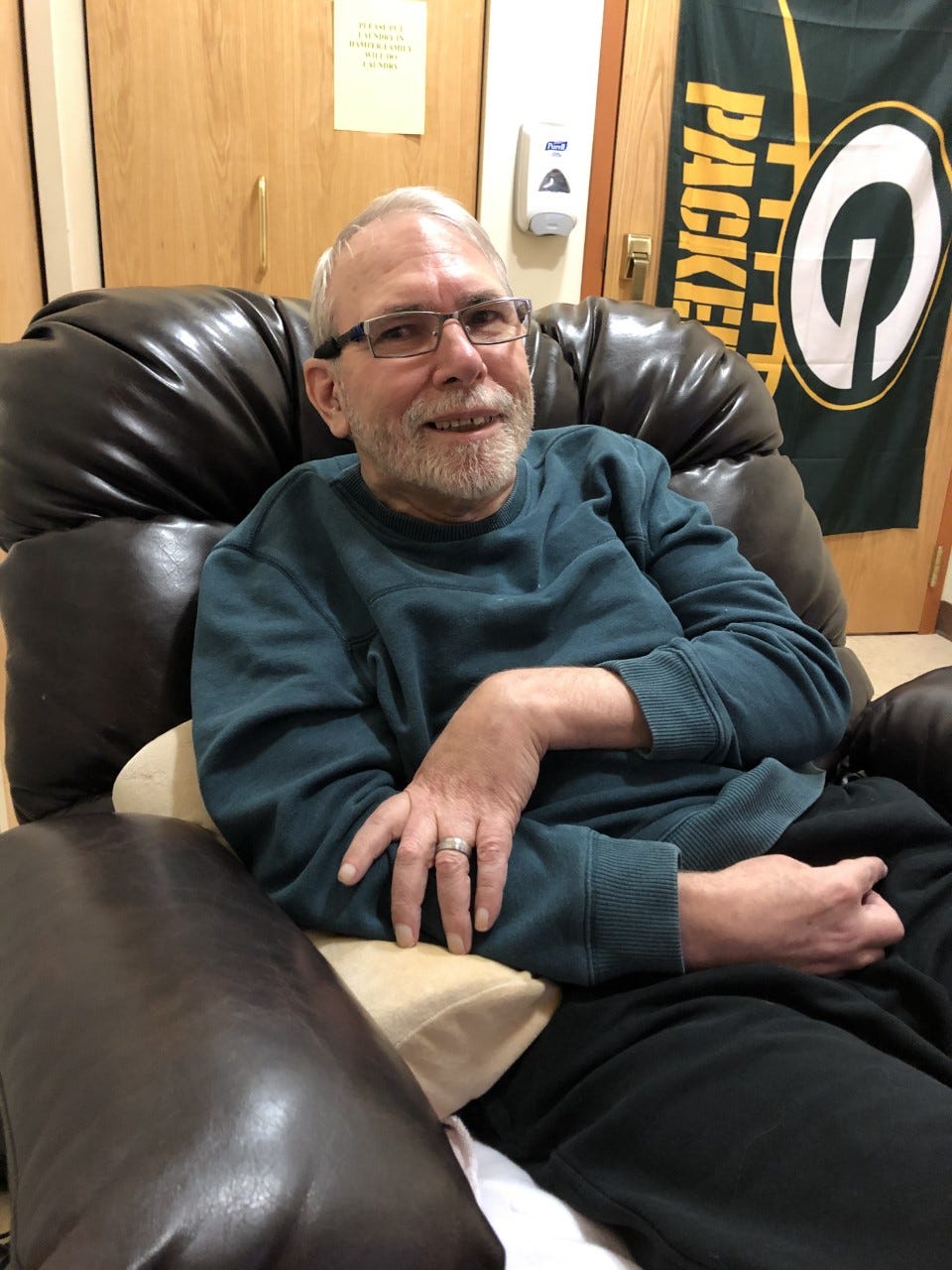
Luane Krall filed a complaint, and an inspection followed. The veterans home received federal citations for failing to notify Luane about Randy's deteriorating condition and making sure he was hydrated. The facility also was cited for not properly caring for his bedsores, according to records from the U.S. Centers for Medicare and Medicaid Services.
Failures in Randy’s care are part of a pattern of violations at the Union Grove home over the past five years, making the Wisconsin facility one of the most troubled state-run veterans homes in the nation, according to an analysis by the Milwaukee Journal Sentinel.
Union Grove ranked in the top five out of 117 CMS-certified state veterans facilities for having the most violations and fines, the analysis found. In the past five years, Union Grove was cited for 62 violations and received fines totaling $250,000.
One of three veterans homes operated by the Wisconsin Department of Veterans Affairs, Union Grove had more violations than the state's two other veterans homes — King and Chippewa Falls — combined.
Family members, residents and volunteers at the Union Grove home described to the Journal Sentinel how a once-solid facility has tumbled into frequent disarray with sometimes dangerous conditions and a staff burned out from forced overtime and constant churn.
“Something is not right at that facility,” Luane Krall said. “It is unbelievable what Randy had to endure. It was horrible. No one should receive this kind of care. (Residents) really dedicated their lives to serve this country, and they are not served there.”
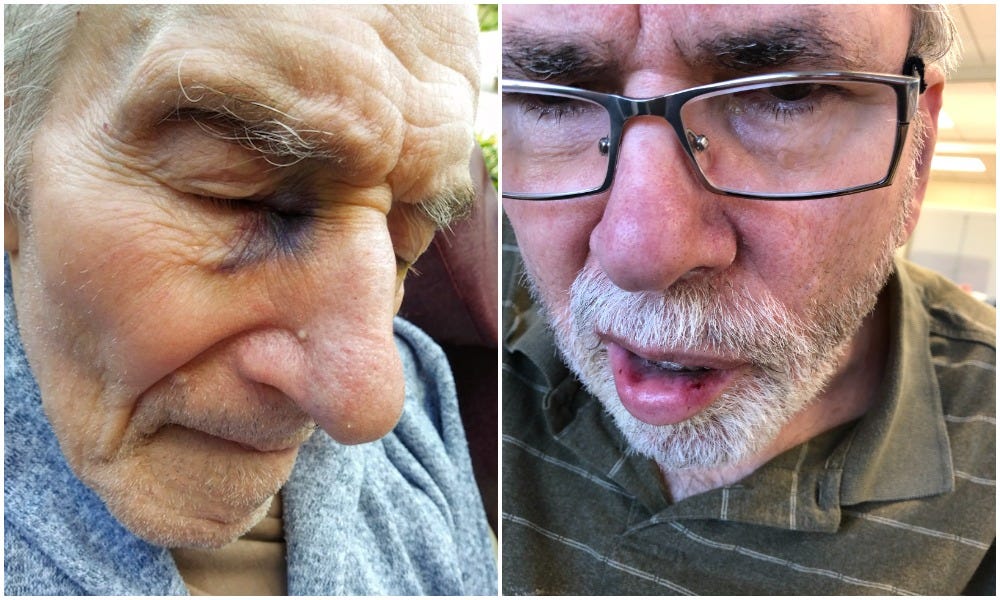
Allen Hanson, 75, who lived at the veterans home for nearly four years, said he moved to a facility in Milwaukee last fall because of poor care. Hanson described a litany of problems at the Union Grove nursing home: medication mistakes, residents falling and trouble getting nursing aides to bring residents water.
Last year, he said, he saw a 95-year-old veteran who had fallen on the floor of his room. An aide told Hanson the man was “acting out” to get attention.
“I said, ‘He is on the fricking floor.’ She said, ‘Mind your own business. Don’t worry about it,’ and went and shut the door,” Hanson said.
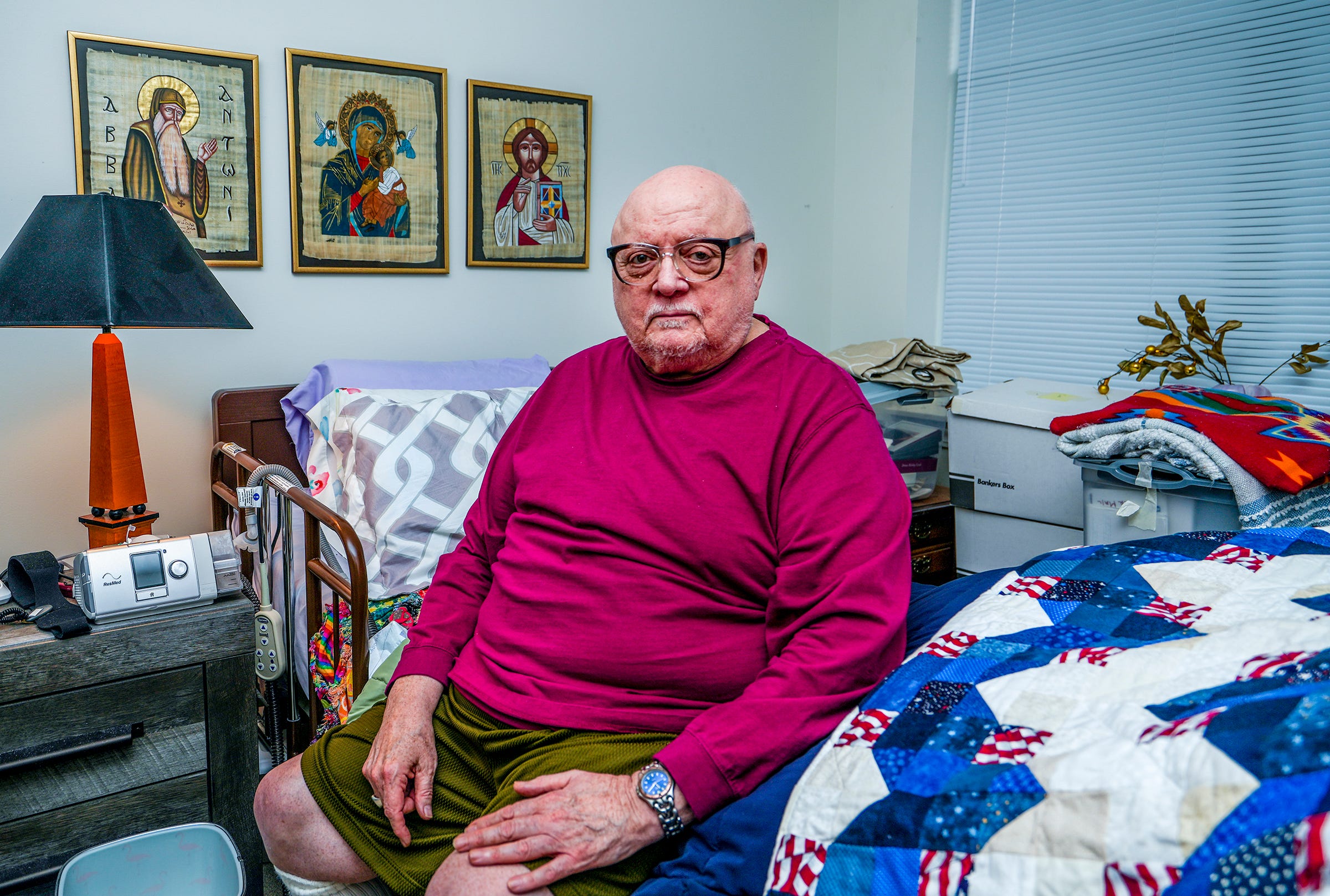
Edward Hartman, 74, who lived at the Union Grove home for nearly three years, said he also left in September because of poor care.
“They couldn’t pay me enough to ever get me to go back. It is a dump,” he said. “They do not care for a veteran like he should be cared for. That veteran was ready to put his life on the line for his country. How much is that veteran’s life worth?”
In its most recent violations from March, the Union Grove home was cited for failing to investigate reports of abuse to patients, not giving residents regular showers, infection control and unsanitary conditions, according to state Department of Health Services records. Federal authorities are reviewing the violations, a spokeswoman with the Centers for Medicare and Medicaid Services said.
The abuse-related violation involved two cases, one in which a nursing aide at Union Grove in January flipped over a resident to clean his genital area, ignoring instructions on how to carefully handle the patient or calling for a second aide as required.
“You are hurting me,” the resident told the aide, according to a video made by the resident and reviewed by a health inspector. Despite the plea, the aide continued. The aide later told an inspector, “I just went ahead and wiped (the resident) and finished.” The aide added the resident doesn't “like me and I don’t like (the resident).”
A different resident said he also was handled roughly by a nurse whom he called “a bully.”
“Gave me big skin tear on my left wrist," the resident told the inspector, according to the report. "Was repositioning me in bed and kept pushing even though I asked (the nurse) to stop many times. Kept pushing.”
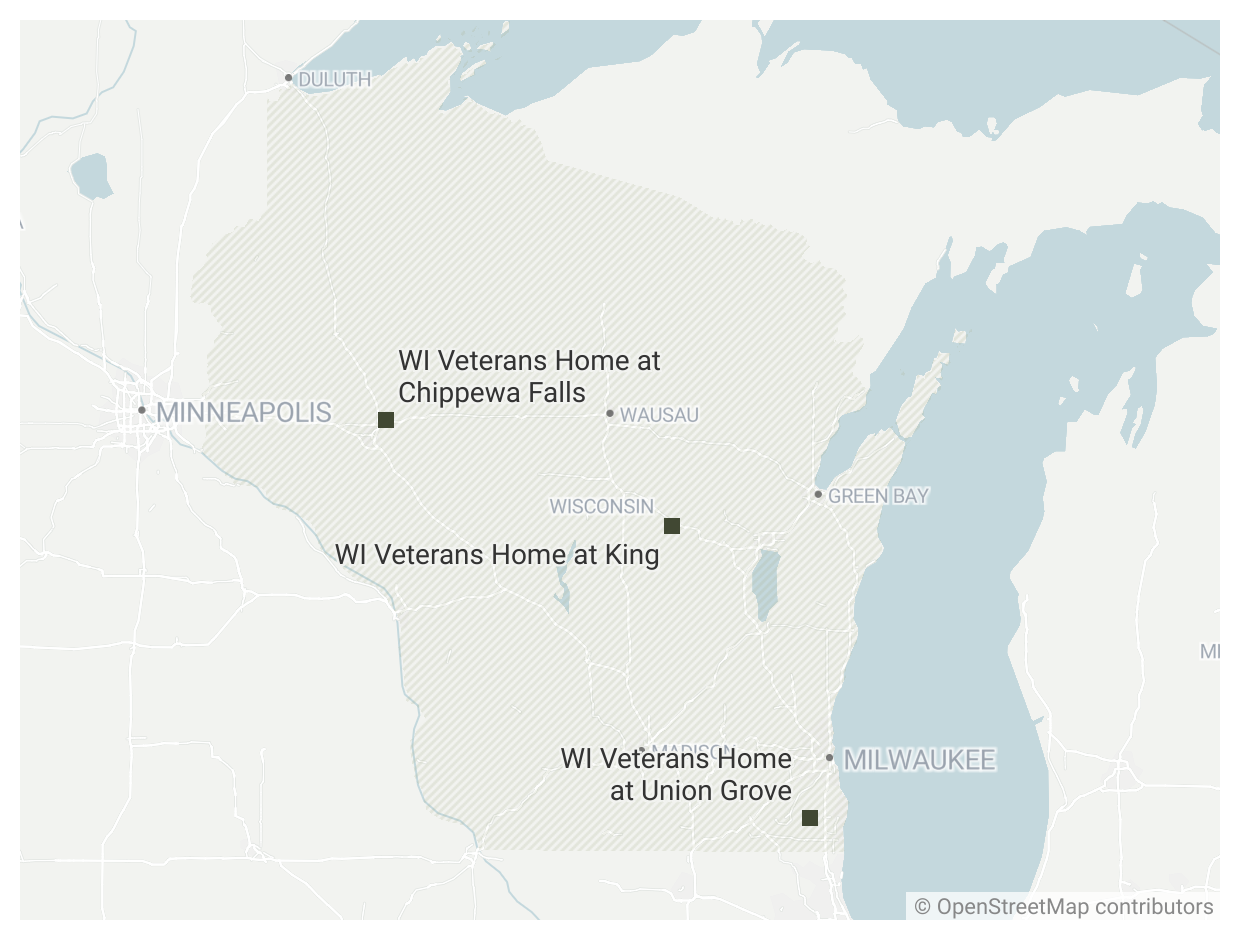
The inspector also found “a thick accumulation of a brown substance on the dishwasher and under the dishwasher,” according to the inspection report. When asked about brown substance, an aide acknowledged it was “disgusting.”
After each inspection, the Union Grove home issued plans to correct the problems, records show.
Mary Kolar, head of the Wisconsin Department of Veterans Affairs, which oversees state veterans homes, blamed the problems at Union Grove on a lack of staff and frequent changes in leadership — with five different leaders in as many years.
“Union Grove is a challenge,” Kolar told the Journal Sentinel. “We are still changing the culture. There needs to be a greater focus, as evidenced by the citations, on the requirements of a skilled nursing facility.”
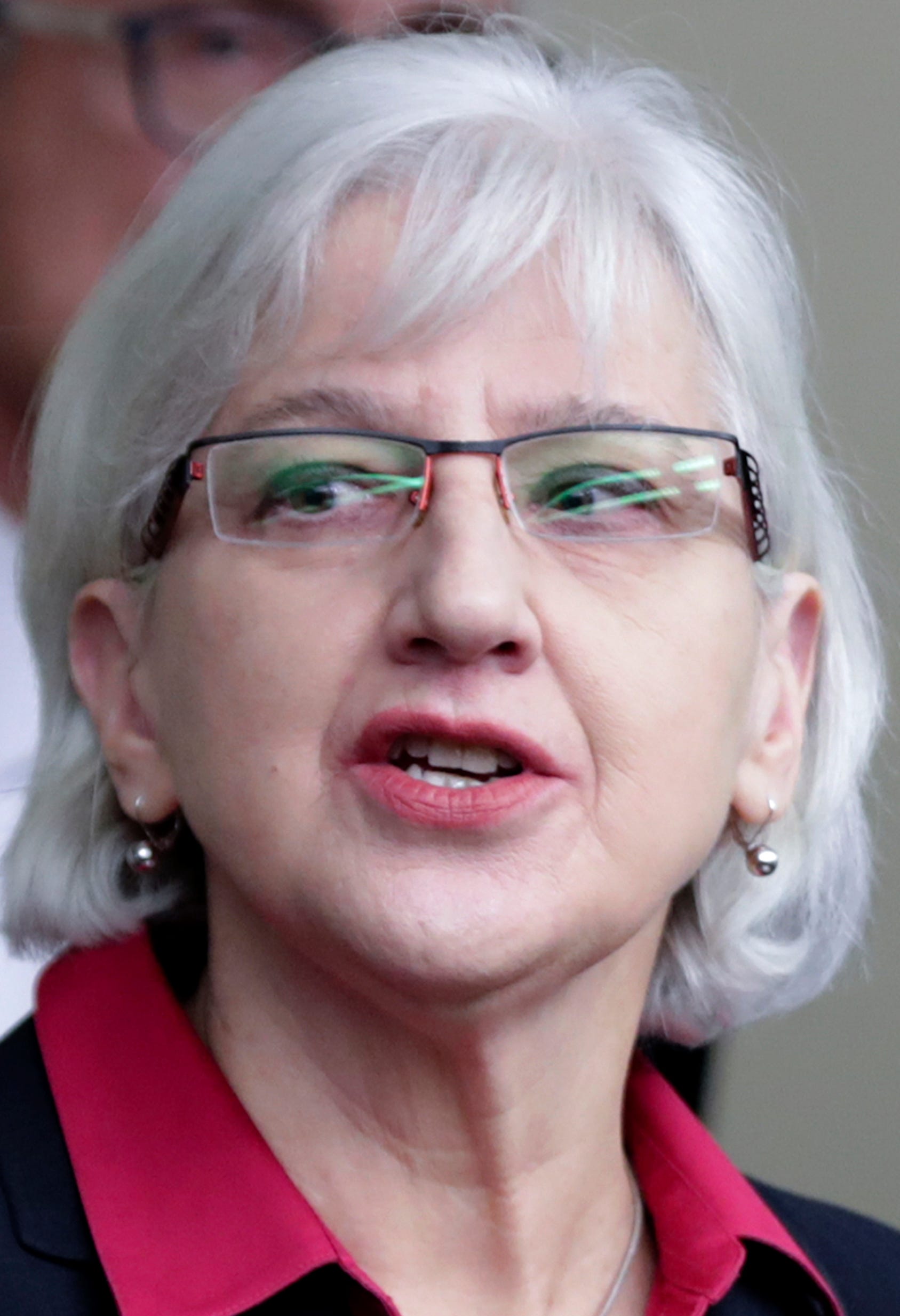
Kolar, who was appointed by Gov. Tony Evers in 2019, as he took office, said she has held administrators at Union Grove accountable for the violations. Kolar said when she took over she confronted the commandant in charge of the facility about dirty conditions revealed in inspection violations.
“The senior person at Union Grove, when I asked about mouse droppings, that person told me, ‘those were doughnut sprinkles.’ So that is the condition we had. We had vermin that were getting inside,” she said.
Kolar did not respond to an interview request to react to the Journal Sentinel's analysis showing Union Grove's ranking among state veterans home nationwide.
Compared to all other nursing homes in Wisconsin, Union Grove's violation record is among the worst. It ranked 27th out of 343 facilities, with three times more violations than the average Wisconsin nursing home, according to the Journal Sentinel analysis.
And while COVID hit many nursing homes across the country hard as they struggled to protect residents, problems at Union Grove occurred before the pandemic and continue, records show.
Colleen Flaherty, the department's spokeswoman, said problems with staffing at Union Grove predate the pandemic and have gotten worse in the past two years. She said steps have been made to recruit and retain staff, providing more money, advertising and other steps.
"While improvements and changes are being made to better serve our members, it’s important to acknowledge how hard the staff has worked up against a uniquely challenging environment," Flaherty said of the past two years.
Union Grove isn't the only Wisconsin veterans home to have problems. Six years ago, an investigation by the Capital Times newspaper in Madison uncovered filthy conditions and substandard care at King, the state's oldest veterans home, which is in central Wisconsin.
The conditions at Union Grove, including the elimination of several activities for residents, led to a meeting in March among family, residents and volunteers. A Journal Sentinel reporter attended the meeting, which was open to the public.
A resident at the meeting told Kolar he sometimes feels like a prisoner of war at the veterans home.
“No one is making you stay there,” Kolar told the resident. “Please don’t call it a POW camp. You have choices.”
State Sen. Van Wanggaard, R-Racine, who also attended the meeting, said veterans shouldn’t have to move; the state should fix the problems.

“This is a benefit they earned. This is a right these guys have,” he said. “Damnit, we have to make sure we have a great quality of life out there. This is absolutely not acceptable.”
In May, when told by the Journal Sentinel about the many violations, Assembly Leader Robin Vos, R-Rochester, called the situation a “crisis.”
"Something dramatically needs to change," Vos said. "I think we have been patiently listening to their reasons and their excuses. Now that time is over. They have got to figure it out."

Violations mount
The nation’s first veterans homes date to the Civil War era when President Lincoln vowed to care for those scarred by battle.
Today, there are 160 such facilities across the country, at least one in every state, providing rehabilitation stays, assisted living and full nursing home care for veterans and their spouses.
The advantage in living in such a home is that veterans may pay less than they would at a privately run nursing facility, depending on their disability benefit level. They also get to live among other veterans who understand what they went through in the service.
The homes are owned and operated by the states but largely funded by the federal government at roughly $1 billion last year. There are 117 state veterans homes that receive federal insurance and therefore are subject to annual inspections as well as inspections triggered by complaints to state departments of health and U.S. Centers for Medicare and Medicaid Services.
The home at Union Grove provided a facility closest to the most populated region of the state. The home has 158 skilled nursing beds, with a patient count of 90, according to the most recent inspection report.
As recently as 2016, the Union Grove home had no violations. But in 2017 inspectors recorded 17, including staff making medication errors, neglecting wound care, failing to alert family to changes in patients' conditions, unnecessarily restraining residents and serving poor food.
Complaints about food were mentioned by all of the residents, family members and volunteers interviewed by the Journal Sentinel. Food for Union Grove is made in King, frozen and shipped two hours south. It is then heated and served.
“It was garbage,” said Hartman, one of the residents who moved out last year. “I wouldn’t slop hogs with it, and I spent 20 years farming so I know what I am talking about.”
Improvements are planned for the kitchen, but the shipping-from-King system remains. Earlier this month, several residents described getting food that was nearly inedible, served on paper plates with plastic utensils. Sometimes, the food is hot on one side, frozen on the other, they said.
In 2018 and 2019, inspectors recorded 25 more violations and issued three fines totaling $67,246, records show.
One of the most serious violations against Union Grove was issued in August 2020 for failing to follow COVID protocols, resulting in a $93,314 fine. Three months later, inspectors were back, and again the facility was cited for poor infection control and received a $9,750 fine, records show.
Like other nursing homes, the Union Grove facility has struggled to retain staff. In recent months, the National Guard has been ordered to help, but Guard members left in mid-May.
Veteran Tom Minich, 76, said earlier this month, "We are in a cement canoe going down the river. That's how we feel with the Guard leaving."
Early on in the pandemic, the facility was offered help from the federal Department of Veterans Affairs in Milwaukee but the state department turned down the help, saying it was not needed, according to a letter from the federal agency to a member of Congress. The help was later accepted after a COVID outbreak.
Last year, inspectors recorded 13 more violations, leading to Union Grove's biggest fine to date, $125,550. That fine was automatically reduced by 35% to $81,608 after Union Grove waived its right to appeal, a CMS spokeswoman said this week.
As with some past inspections, the violations included failing to control infection spread and not properly treating pressure sores. This inspection also found not enough was done to prevent residents from falling. One resident was recorded as falling 13 times over six months with staff failing to take steps to protect the resident.
There also was a violation issued for giving a resident too many opiates. A nurse found the resident unresponsive, and he was rushed to the hospital where he was given medication that revived him, the report said.
“I was in bad shape. I was very close to dying,” the resident told the inspector, according to the report. “My wife thought she was going to lose me.”
That incident was also not investigated, the inspector found. When asked why, a Union Grove nurse said it was not a “drug overdose” but rather a mistake. The inspector said it still should have been investigated.
Inspectors were back last August and issued violations again for improper wound care and for over-drugging a resident, this time giving too much of an anti-anxiety medication, records show.
U.S. Rep. Bryan Steil, R-Wis., whose district includes the veterans home, said in an interview that he is concerned by the violations and the Journal Sentinel’s findings. He said he has received reports of problems at the home for years, but he didn’t understand the scope until the Journal Sentinel shared its analysis with him.
“It makes your stomach just churn that our veterans did not receive the care that they deserve,” Steil said.

'Cruel' treatment
Roberta Mundschau, whose husband Jim lived at the facility for two years until he died in November, described the care as “decent” initially but that it quickly went downhill.
Roberta said she would come into her husband’s room and find him sitting in the dark, with water out of reach. Jim, a former industrial product designer, was paralyzed, suffering from dementia and was blind.
“To leave someone with dementia sitting in the dark all the time I thought was cruel. The poor guy — he was at the mercy of whoever was taking care of him,” said Roberta, 81, who is retired and lives in the city of Waukesha.

She said she wrote a note for staff and pasted it to the wall: ‘If you are in Jim’s room, please offer him water.’
Roberta said she once found one of his teeth on the floor of his room. She couldn’t find a staff member to ask how he lost it.
She said there also was unexplained bruising on his body. He also had dried blood on his face, and once Roberta arrived to find Jim with a black eye. She asked what happened. The nurse said the injury happened when they were putting on his sunglasses.
“I didn't buy that answer at all,” Roberta said. “I understand taking care of him was difficult because he needed help with everything, and he couldn't do anything himself. Some employees did a great job, and others didn’t.”
Jim, 89, died Nov. 15 from COVID. At that time, family members were not allowed into the facility. Roberta said she doesn't know how her husband contracted the virus while living in the home. But she said she wonders if the facility's failure to take precautions against COVID the previous year continued to exist up until her husband's death.
“I felt sad and frustrated for him,” she said. “It seemed like a very sad end.”
She said she complained to staff but didn't file a formal complaint with the state. It's unclear whether any of the violations at Union Grove involve her husband's care.
Laurie Miller started coming to the Union Grove home as a volunteer more than five years ago, after her son enlisted in the military. Prior to COVID, she was in the home four to five days a week helping with activities and events. Currently, Miller visits with veterans who don't have family coming in and helps with their needs.
Miller said she has seen care deteriorate. Earlier this year, she said, a resident told her that he called for help getting out of bed to go to the bathroom for more than an hour before he wet the bed, the first time that has happened in his six years there.
Last fall, Miller came for the 75th birthday of a resident with ALS. At 1:30 p.m., she walked in to find the man by himself in a common area in his wheelchair without his teeth in, with his breakfast, now cold, halfway across the table and water out of reach.
“I don’t know if he could have eaten if he tried. There was no possible way he could get to it,” Miller said.
Miller asked a staff member why he was left this way. An exasperated aide blurted, “‘This is (expletive), but it is not my fault,’” Miller recalled. The aide said she alone was responsible for 20 residents that day.
Susan Nosalik said her husband, Joe, lived in the home for two years and that she, too, saw a slide in care. He had advanced Parkinson’s Disease and dementia.
Joe Nosalik was in the Marine Corps and then worked as a Racine police officer during the week and a nurse on the weekends for 28 years. Sue also was a nurse, and they met in the ER.
Joe, 77, died from COVID in December 2020, three months after the Union Grove facility was cited for failing to take precautions against the virus.
Sue believes those violations contributed to her husband's death, though the inspection reports do not link the violations to deaths.
“When I found out they had been cited, and it was so significant — of course, he got COVID. They were not careful, taking it from room to room,” said Sue, 69, who is retired.
In a recent interview with the Journal Sentinel, Kenney Blue, who has lived in the home for eight years, said he can’t get out of bed by himself and is frustrated when he puts on his call light and no one comes to the point that he urinates in his bed. He said he has been left in bed until noon some days.
“They come like 30, 45 minutes later and say, ‘Can I help you?’ I say, ‘It’s a little late now. I was calling to use the bathroom. What if I was having a heart attack or a stroke?”

'Why don't you leave?'
Randy Krall, the Navy veteran so dehydrated doctors couldn't get a urine sample, suffered through four years of shoddy, negligent and sometimes abusive care, his wife said.
There were serious medication errors, botched catheter insertions, unexplained bruises and a host of more minor but still galling indignities, Luane Krall said.
“I would have to be there constantly,” she said. “I swear to God they would have killed him if I wasn't.”

Randy, who had worked in banking and real estate, had progressive dementia and Parkinson's. By 2016, he needed skilled care. Living in nearby Waterford, the couple figured the veterans home would be perfect.
Shortly after Randy moved in, problems arose. One day, Luane spotted a nurse walking into her husband’s room with a medicine cup at 10:30 a.m. The nurse told Luane she was bringing Randy’s medication that was supposed to be given at 7:30 a.m. but that she was three hours late.
Then she came back 45 minutes later with the same medication. Luane said she stopped her: “I said, ‘Oh no. if you give him that medication, it reduces his heart rate.’ She leaves and checks and comes back and says, ‘You are right.'"
Over the years, Luane said, she filed four formal complaints, took pictures and frequently complained to nurses, social workers and the administrator.
The nurses "asked me several times ‘why don’t you leave?’ I said ‘why don’t you fix the problems?'"
In 2019, Luane said, she overheard another veteran in the lunchroom asking a staff member to take him to the bathroom.
“He said, ‘Can you take me before I soil myself?’ The aide said, ‘I’ll take you after lunch,’” Luane said. “I’ll always remember that. And this was a man who could talk. What about those, like my husband, who couldn’t talk?”
She recalled how she was leaving the facility one summer evening in 2018 and discovered a resident had been left unattended in a wheelchair outside in the rain.
Luane Krall said she intends to file a lawsuit against the state, contending negligent care of her husband. Her attorney, Kevin Martin, noted that the Wisconsin Department of Veterans Affairs website says its nursing homes "are among the best in the country, boasting an excellent safety record and the highest quality of care ratings."
“If this is the highest quality of care provided to our veterans and our heroes,” Martin said, “then God help us.”
Journal Sentinel reporter Katelyn Ferral and USA TODAY Data Reporter Jayme Fraser contributed to this report.

Contact John Diedrich at (414) 224-2408 or jdiedrich@gannett.com and Daphne Chen at (414) 224-2064 or dchen@gannett.com.